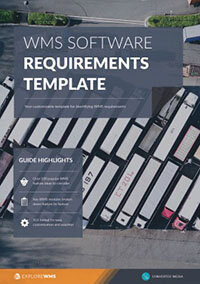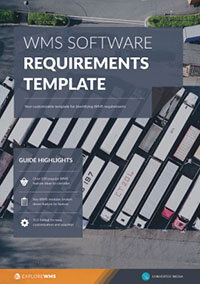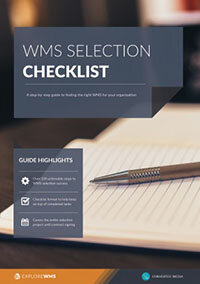What to include in your WMS RFP template
How do you find the best WMS for you? Pit all the packages you’re considering against each other and choose the last platform standing.
To do that, you’ll need to put out an RFP (request for proposal). These documents must be incredibly comprehensive and are hard to craft. Here’s a quick overview to get you started.
Functionality you need
Here is where you list what you want, need, and would like to have in a perfect world. Structure your requirements and questions following core functionality and segments of your business. Each process needs its own section so that you expand needs and give vendors a chance to explain their value-adds and differentiators.
Some segments to consider and provide a variety of questions, metrics, and requirements within include:
- Receiving
- Put-away
- Yard and appointment setting
- Asset management
- Inventory management
- Quality control
- Picking
- Packing
- Shipping
- Performance management
- Integrated WMS slotting
- Alerts
- Audits
- Labor management
- Specialty sections, such as cold supply chain, manufacturing, unique sensor needs, multi-tenant warehousing, etc.
Existing technology requirements you have
Physical infrastructure
List out the physical items you use in your warehouse to make sure that everything is supported, plus ask about what additional items are covered in the vendor’s WMS. Not only are you thinking about PCs and trucks but also your RFID sensors and any warehouse robots.
Software in use
This section of your RFP should touch on both software you have in place and the software that the platform may interact with in the future. Ask about different tiers of support in each flavor of their WMS, focusing on applications as well as operating systems.
Our WMS requirements template helps you draw up and prioritize a list of software requirements
Review your server requirements and ask about support across systems as well as across warehouses. You need systems that can share a single database, but you may also have middleware and other applications you want to be shared.
Hardware architecture
This is your space to ask about server requirements, cloud deployments, virtualization options, and much more. Look at customer and supplier networks as well as security capabilities of the platform. You want to make sure you can scale the WMS up and down as needed, without hiccups to uptime, security, information backups, and physical support options like redundant power supplies.
Required integrations, especially ERP
Integration with existing systems is a core functionality requirement of any smart WMS and a must-have to keep your operations running smoothly. For your RFP, it’s time to look at exactly which systems you have and must connect, then dive a little deeper to ensure integration success.
Specifically, you need first to list out the platforms to integrate with and your ERP — and likely your CRM — are absolute musts.
After providing a checklist of which systems they need, ask questions about the process and their experience with each system. Ask about past successes, number of integrations they’ve performed, and their business plan for integration with your platforms as well as how they support you adding new customers.
If you have special WMS requirements, make sure you touch on them here as well.
Company information from your vendor
Finally, get an idea of the overall company who is responding to your RFP. Look at vendor details discussing their clients and history as well as warranty and other standard requirements.
Beyond the usual, it can be a good idea to ask about user groups and testing phases to make sure that the platforms you’re considering are thoroughly tested and make updates based on actual user input.
And one final thought: if someone does not make it easy to contact them in multiple ways (email, physical address, phone…), then it’s probably a promising idea to knock them off your list.
Free white paper

WMS requirements template
Over 120 WMS feature ideas to help you build a requirements list and shortlist vendors

Featured white papers
-

-

WMS requirements template
Over 120 WMS feature ideas to help you build a requirements list and shortlist vendors
Download
Related articles
-

Your complete WMS features and requirements guide
How to gather requirements for a new WMS, and features to look for to meet them
-

Mission-critical features of food lot traceability software
What features of food traceability software will help you during a food recall
-

Here's your complete WMS modules and features checklist
All the features and modules you might need in your WMS - perfect for requirements gathering

